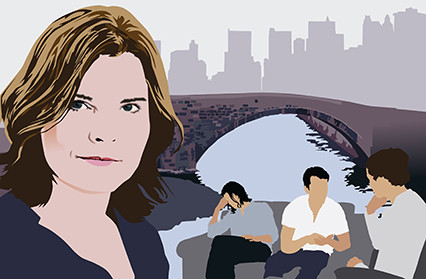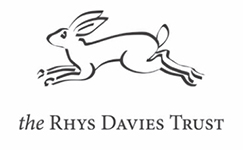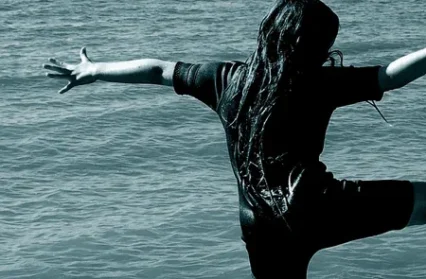I didn’t really believe in marriage counselling. But then I was married to an American and he could do all the believing for me. He was convinced my antipathy was embedded in some kind of Welsh stiff upper-lipness; that we attributed some kind of stigma to therapy and regarded the whole thing as an admission of failure.
My aversion stemmed from the fact I was cheap. I regarded it as an exorbitant way of stalling the inevitable demise of our marriage. ‘The Welsh have no qualms discussing their failures,’ I pointed out. ‘We’re just not accustomed to paying for the privilege.’ After all, that’s what family and friends are for, not to mention the occasional stranger in a bar. But for £85 an hour every week, our counsellor Erin was the human equivalent of rent. For that kind of money, I expected our notes to be scribed in calligraphy. For that sort of money, I expected our mediator to be a C-list celebrity.
Surprisingly my husband was something of a closet glutton when it came to counselling, which you would never think to look at him. You certainly wouldn’t think it to listen to him given his dogged conciseness in conversation. Information was something you waterboarded out him. It was seldom donated, least of all at the behest of a question.
To my amazement, he was also well versed in relationship counselling, having dabbled with the dark art with his previous fiancée and his long-term girlfriend before that. Perhaps couples’ therapy was a rite of passage in the US, akin to taking things to the next level, fifth base. Instead of throwing car keys into a hat, you resolve to seek professional help.
I suggested his perennial return to marriage counselling was indicative of a chronic ineptitude at relationships. Whatever lessons these marital shrinks were trying to impart, the penny just wasn’t dropping. Nothing was changing apart from the girl in the chair next to him. These were precisely the types of comment that weren’t constructive to our relationship. This was also why we were here.
Erin, our counsellor, was a lovely dumpling of a thing. She always ran to greet us at the door of her Newport house. Her enthusiasm usually outraced her legs and behind the frosted window we would hear her tripping and tumbling over hallway obstacles. She would always appear full of zealous hellos, a mess of mousey hair and a litany of excuses for her clumsiness. I adored her; she was utterly human and marvellously unprofessional.
She was also American, at my husband’s insistence. It meant she satisfied the exacting qualifications of a US therapist. (Apparently anyone in the UK could be a counsellor.) It also meant she would hopefully understand where my husband was coming from. He would never have trusted the advice of a Welshman, not in a million years.
The bookshelves in her front study were full of jibes on her profession, Psychology for Dummies, a pair of Freudian slippers, Lucy’s psychiatry stall from the Peanuts comic strip, cards of purple sunsets with italicised nuggets of wisdom. I wondered if she had a version of Guess Who? where you could play multiple personalities simultaneously.
Erin also had a sandpit in the hollow of her coffee table, which was also therapy-related. I was rather keen for ‘our process’ to graduate to the sand castle level. I knew I would win hands down. My competitive nature was also a hindrance to the future of our relationship.
Our first session solely consisted of my husband ‘sharing’. This was a good thing given his sparseness of conversation ordinarily. In essence, he stated he could only do his job effectively if we moved to London. Erin concluded that he might experiment with living in London during the week and returning to Wales on weekends. You could have cut my husband’s silence with a diamond as he wrote the cheque.
The second session was uncannily similar to the first. Though on this occasion my husband stipulated that we had to move back to New York, as that was the only place where he had ever really been happy. Erin nodded sympathetically. She closed the session with the possibility of him returning to New York with us visiting him as and when we could. The cheque ripped beyond its perforation.
During the third session, my husband conceded to the possibility of Cardiff, but even then it wasn’t relevant to his job. He was pandering to my desire to remain in Wales.
It was during the fourth session that Erin pointed out that I hadn’t uttered a word during our past three meetings. My response was that I wasn’t fucking moving anywhere. And thus the ribbon was cut and the channels of two-way dialogue were officially declared open. Erin identified that this may be a source of conflict. She was good. Real good.
After this, I started rather looking forward to our counselling sessions. I treated the whole thing a bit like ‘date night’ with Erin as our rather overpriced chaperone. These were the rare occasions I heard my husband talk in successive sentences. Our domestic conversation had become cumbersome and perfunctory and usually only pertained to the baby. I probably should have mentioned that earlier. Yes, we also had a baby.
I suspected my husband approached the sessions like a lapsed Catholic returning to Confession. Did the sheer act of attendance absolve him from being a feckless member of the flock for the remainder of the time? Were the other six days of the week the marital equivalent of penance?
During our seventh session, Erin suggested we get the crayons out. This felt like a precursor to the sandcastle stage. She wanted us to draw our ‘vision’ of family and home. I started clapping my hands like a demented sea lion. However, I knew my husband would not mirror my enthusiasm. This was precisely the type of Mickey Mouse, cod-psychology, he would never espouse.
‘I didn’t come here to draw any goddamn pictures!’ he muttered, plucking phantom fluff out of the IKEA cushion.
Despite Erin’s gentle coaxing, my husband refused to partake of the arts and crafts therapy. Instead he decided this was the optimal time to critique some of Erin’s chosen methods, in particular her willingness to offer advice. Apparently that was not noblesse oblige, the done thing. After all he did have a wealth of therapists to compare her to.
He also chastised her for making judgment calls. The previous week, she had described him as the angriest person she had met in eight years. My wholehearted agreement, which bordered on a high five, was also deemed unsupportive by my husband.
I was bemused. Judgment calls and counsel were the least I expected for £85 an hour. They were the least I expected from anyone. I think I would have torched the bookshelves and the Freudian slippers, had I merely got the nodding dog routine and the occasional mantra of ‘how does that make you feel?’
Erin resumed her ferocious scribbling and barely said another word for the remainder of the session. Poor Erin. I felt sorry for her. He shouldn’t tell her off like that, not in her own house. She was only being nice and doing her job, just not the way he liked.
I suppose he was right about the crayon pictures though. They would have proven very little apart from our retarded doodling abilities. I think we probably would have produced identical cartoons, a one-dimensional house with cross-hatched window panes, smoke coming out of the chimney, the three of us prancing outside the front door grinning rictusly with a blithe sun smirking down at us.
The question was where to anchor this family and home. I wanted to remain in Wales; he wanted to return to the US. That was the fundamental irreconcilability, we thought. That was why we were sitting here, why we failed to get on.
The truth was Wales was killing him, especially living in Bridgend. Somebody once said there was something in the water that had caused that epidemic of suicides some years ago. And in less than two years, the confident, relaxed man I met in Manhattan, had paled into a ghost of himself, an angry monosyllabic one.
He couldn’t make sense of anything here, he said. After two years, everything was still unfamiliar, nothing worked, nothing tasted as it should. He felt like a fraud, inventing and improvising his existence in the ‘Boonies’ of this Cardiff suburb. He still had no real friends or family here apart from the baby and me and even we were dissolving before him.
Which begged the question, why was I refusing to move? Because somewhere along the line, I had stopped sympathising with him. I had stopped feeling guilty for the sacrifice he had made to be with me, moving all the way from New York to Bridgend. Instead, I was annoyed at him. I was sick to death of his never-ending indictment of my hometown, its backwardness, its drunkenness, its commonness, even the maternity ward at the local NHS hospital reminded him of a makeshift wing in M*A*S*H.
I knew Bridgend was imperfect. I knew it better than anyone. But your hometown is like the black sheep of your family and only blood relatives have the natural right to slag it off. If anyone else tries to trash the place, you turn into a poor man’s Braveheart, willing to defend the place to the death with a broken pint glass. The more he complained, the angrier I became and the more I wanted him to leave, the more I was desperate for him to leave, both for his sake and mine.
But here he was, stuck. Stuck in the quicksand of this sham marriage, stuck in a town he abhorred, tethered by a wife’s unwillingness to budge and bound by a daughter he wished to see everyday.
Added to that he was now living here on borrowed time. His two-year marital visa was due to expire in the autumn. Now he had to summon a small fortune to apply for indefinite leave, just to continue residing in a place he loathed. And if he failed to get that, he would have to return to the States, relegated to visitor status, only getting to see his daughter for a handful of weeks a year. And I didn’t wish that upon either of them.
One of my money saving ideas was to discontinue the marriage counselling. After all it wasn’t getting us anywhere. It was more of a vanity project really. Without the therapy, we would save nearly £400 a month.
But my husband was no fool, despite my usual insistence to the contrary. He knew it was buying our marriage time. After all, Erin was the angelic optimist of our wedlock, the lone cheerleader for team US. She was literally the only one invested in our future.
There was no doubt in mind that he had chosen a fellow American as a therapist on the assumption that she would feel more sympathetic towards him, that she would relate to his disdain for this country, that he would not feel alone.
But my motivations for attending marriage counselling weren’t entirely honest either. I still resented paying someone an obscene amount of money to witness our domestic tug-of-war. But then maybe it was in Erin’s interests to observe and corroborate just how vile we could be to one another. This wasn’t polite company where we had to temper our tongues. She had a fiduciary duty to sit there and take it, playing umpire to our endless bickering.
The truth is, I wanted her on my side. I wanted the American therapist who met my husband’s exacting standards, to say in no uncertain terms that we should end the marriage. I wanted her to bite the hand that fed her.
I was secretly gleeful when my husband corrected or chastised her; or refused to answer her questions or spurned her crayon exercises. Surely that underlined just how impossible he was to live with. Surely that undercut her ability to like or empathise with him. Surely she could now understand why I so desperately wanted to leave this marriage.
I needed her validation. I needed him to hear it from her, a fellow American, a professional therapist. He had to hear it from someone who was impartial and calm. It had no credibility coming from me any more. I was the irrational, crazy one. I was the unreliable witness in my own marriage.
And then something shifted.
It was our eleventh session and Erin was more giddy than usual. Apparently, she was going away on a camping trip for two weeks with her family, immediately after our appointment
The realisation hit me and I started to panic. She was going to miss our weekly session. She had never missed a session before and more importantly neither had we. We were going to have to wait an entire fortnight until we could defend ourselves, self-justify our positions. We would have to wait two whole weeks for a positive appraisal on how well we were coping.
I became fidgety, I had become dependent, I had become addicted. I thought I could handle it, once a week for fifty minutes, just a bit of fun, no harm done. I wanted to ask if there was anyway of contacting her while she was away, in case we went into meltdown, Skype, texting, instant messenger. Would she even have reception at the campsite?
It was official. Counselling was the new crystal meth. No wonder the whole of the US were at it. No wonder my husband was mainlining on both sides of the Atlantic. This was how he could afford to be reticent. Behind the scenes, he was gushing to a paid stranger, concentrating a week’s worth of conversation into an hour.
Even my attempts to discuss our relationship at home had been curtailed with the response: ‘I don’t think we should be discussing this outside our sessions with Erin.’ Our marriage had become a taboo subject inside our own house.
Erin was no longer the plush chaperone. She was now an extension of the marriage, an alter ego. She was our middleman, candy-coating the insults that were being thrown like crockery. His criticisms of me weren’t actually about me, they were about himself. They derived from fear. They were a cry for help. She even apologised on his behalf, reassured me I was a good mother, thank you Erin, thank you Husband. She even told us we were actually agreeing with one another, even though it appeared we were incessantly at loggerheads. She told me he still loved me.
She was brilliant! And I had fallen for it. She was the quintessential con artist, playing us in favour of each other. Therapy had blurred my perspective. It had made my trademark cynicism woolly, pastel-shaded, italicised. Erin had plumped me up like one of her IKEA cushions, delivering unadulterated flattery under the guise of ‘constructive feedback’. It proved just how little kindness was required to keep our flimsy marriage fastened together. We just weren’t capable of propagating it ourselves.
If I was going to endure cold turkey for a fortnight, I thought, I may as well sever the supply altogether. After all, my sadness had now curdled into pure exhaustion. I couldn’t muster the will to be angry any more. Apathy had doused that too. Nor could I summon the energy to leave him. The mental effort required to even conceive of the logistics, the disassembling of our inextricable lives, was enough to make me want to curl up in a corner.
All I could do was sob, uncontrollably and pathetically. I kept spluttering that I no longer loved him. I kept repeating it and repeating it like a broken record. I couldn’t understand why this piece of information was being so plainly ignored by both of them.
My husband’s rebuttal was that this was somehow a flaw of my character, an emotional handicap, a patent lack of gratitude.
Erin’s response usually erred towards setting us homework, asking us to try and remember what we originally loved about one another. ‘I thought she was someone I could co-operate with,’ my husband said.
‘I think the two of you should think about separating,’ Erin said. ‘Just for a while. Just to see how things go.’
We paused. I even stopped weeping.
‘And I can perhaps help you with that transition if you want me to. What do you think? Shall we book something in for two weeks from now?’
From behind the tattered tissue, I looked at my husband, sniffed and nodded. Erin was already peeling her way loudly through the pages of her thick diary. My husband shook his head, more out of disbelief than contention, as he tugged at the curled chequebook caught in his back pocket.
original illustration by Dean Lewis













